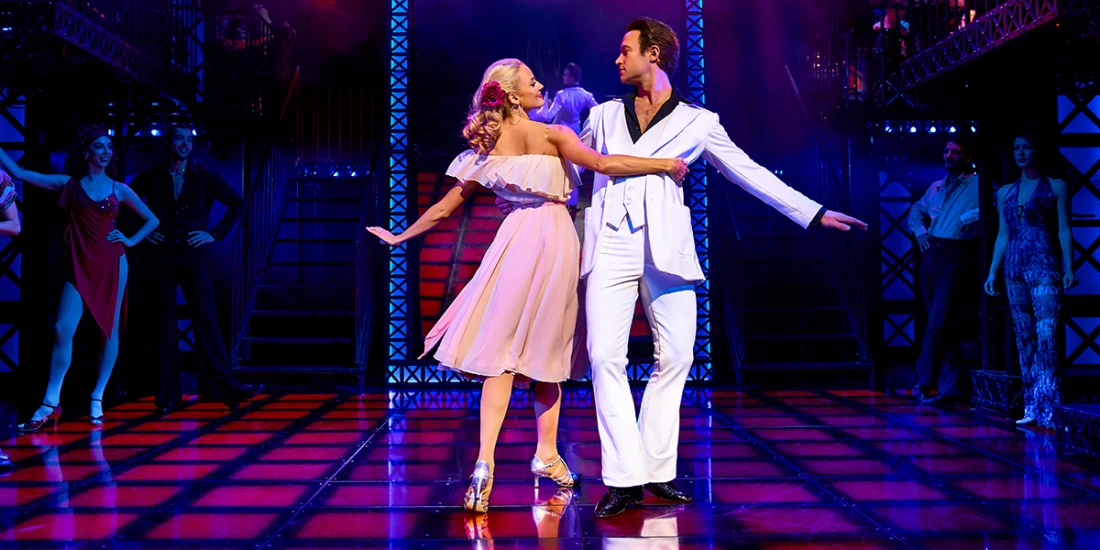'Saturday Night Fever' review — a groovy revival with heart and nostalgia
You should - and will - be dancing along to this disco inferno of a show, part of a touring run that is doing a London stint at Sadler's Wells' West End house, the Peacock Theatre. From the Bee Gees soundtrack to the famous white suit and boogieing cast, it's a blast from the past - though one with surprising emotional heft alongside its retro pleasures. If your vague memory of the 1977 movie, which made John Travolta a star and disco a worldwide craze, is of colourful dance floors and finger points, well, you'll certainly find those here, but also a sincere story about working-class kids with few prospects longing for escape.
Italian-American teenager Tony Manero still lives with his parents in Brooklyn and toils at the local hardware store. It's a humdrum existence: on being told that he could have a steady job at the shop for years to come, he likens it to a prison sentence. But when he's at the discotheque, he's the star. There are no worries about the past or future - there is only that moment.
Several subplots feed into Tony's ideas about possible ways out, or being trapped in this stasis. His brother Frank was the golden child because he joined the priesthood, but he returns home disillusioned by church teachings and losing his faith entirely. One of Tony's friends, the boyish Bobby, is frantic because his high-school girlfriend is pregnant and refuses to get an abortion, which means getting married.
Most significantly, Tony meets Stephanie, a talented dancer who works in Manhattan and is determined to better herself, constantly correcting her own vocabulary and pronunciation so she can fit into a high-class office. She agrees to partner Tony in an upcoming disco contest, but rebuffs his romantic advances.
Bill Kenwright's slick staging loses some of the grit of the film, and the dance numbers tend to be more presentational and synchronised rather than sweaty, organic clubbing, but, to its credit, the show sticks with the story's dark subject matter. In the dramatic second half, it grapples with sexual assault, racism, domestic abuse, and suicide, and interestingly subverts our expectations around the big set-pieces like the dance competition.
Tony is also a complicated hero. Although he starts to question his toxic, macho gang, he's capable of nasty behaviour himself, often viewing women as either sexual conquests or inconsequential. He brutally rejects local girl Annette, who is desperate to "make it" with him. We understand why when we hear that all her sisters are married, and that there's little else for her to aim for - plus Tony is the least boorish prospect.
The production does have a similar issue to fellow screen-turned-stage show Dirty Dancing, also in town as part of a national tour, in that it feints at being a musical but doesn't commit. A fantastic trio (Jake Byrom, James Hudson and Oliver Thomson) re-create the Bee Gees' falsetto hits, backed by an exhilarating live band, but the actors seldom express themselves through song. As Stephanie, Olivia Fines belts out one ballad, and Kevin O'Dwyer, as Bobby, wails his way through "Tragedy," otherwise the songs remain more of a cinematic soundtrack.
However, the dancing - choreographed by Bill Deamer - is brilliantly used to illuminate character and emotion, and to communicate a sense of joy and liberation. Richard Winsor, best known for his work with Matthew Bourne's New Adventures, nails Tony's prowling, silky strut and effortless cool. Everything is controlled and refined, from the crisp isolations and perfectly placed hand jive to the focussed, sensual partnering, in contrast to the turmoil in Tony's life. Winsor has fun with the dandy side of Tony, too. The only false note is an angsty climatic solo that strays into cliché and lacks the required abandonment.
Fines is excellent as the ambitious but conflicted Stephanie, and her dancing is gorgeous: supple, fluid, and groovy. Like Tony, she finds the serenity she craves through movement. O'Dwyer and Mario Nicolaides are strong as Bobby and Frank, respectively, but Phillip Aiden is underpowered as Tony's supposedly fearsome deadbeat dad.
The ensemble numbers are pin-sharp, funky and exciting, and the disco scenes feel immersive thanks to the colourful lights dancing out into the audience via multiple disco balls. Gary McCann's industrial set works well in concert with Nina Dunn's video projections, plunging us into the New York streets or showing the vast Brooklyn Bridge - Tony's route to freedom. Funky and heartfelt entertainment.
Saturday Night Fever is at the Peacock Theatre to 26 March.
Photo credit: Olivia Fines and Richard Winsor (Photo by Paul Coltas)
Originally published on
